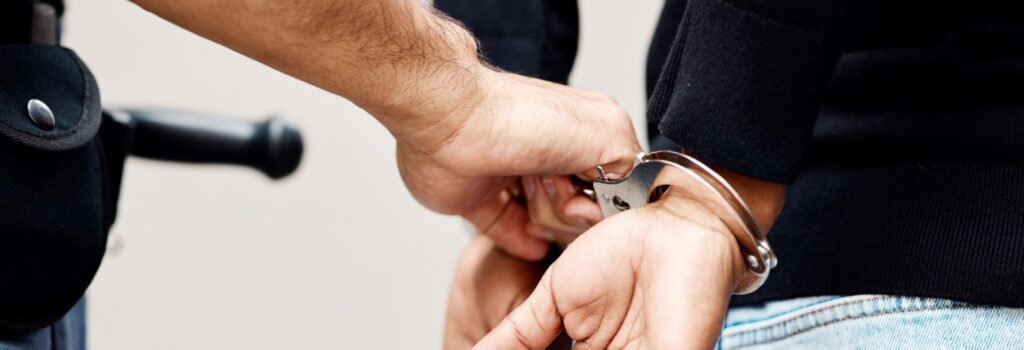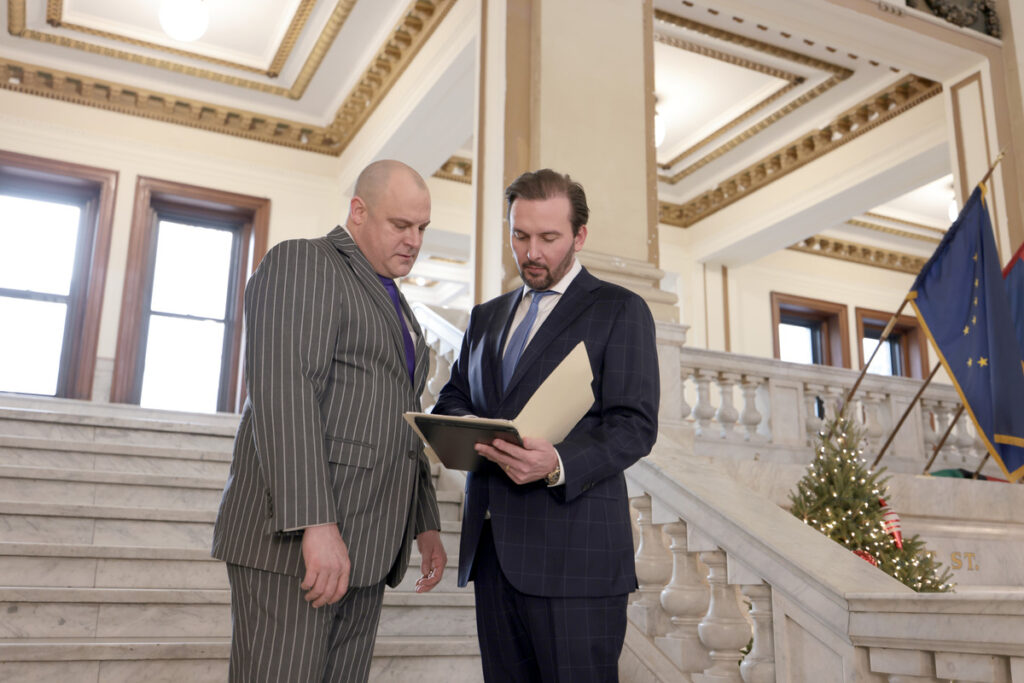Being arrested or charged of a DWI in Missouri can have lasting implications. If you find yourself in this situation, it’s important to contact legal representation immediately. Our Missouri DWI Lawyers at Combs Waterkotte serves St. Louis, Kansas City, and the entire state of Missouri by providing legal support in these situations.
Here are 10 of the most common questions we get about DWI charges, your rights after being pulled over, and how we can help defend your case. You can view our video about What To Do During a DWI Traffic Stop for even more information.

Table of Contents
- What To Do During a DWI/DUI Stop
- Should I Refuse a Field Sobriety Test and Breathalyzer?
- How To Fight a DWI/DUI Arrest or Charge in Missouri
- What Is the Process of Going to Court for a DWI?
- Can You Drive After Getting a DWI in Missouri?
- How Long Does a DWI or DUI Stay On Your Record?
- How Does Probation Work for a DWI Conviction?
- Can You Plea Bargain a DWI Case?
- Can a DWI Be Expunged in Missouri?
- What Do Police Look for During a DWI Stop?

What To Do During a DWI/DUI Stop
Knowing what to do during a DWI stop can make a major difference in how (or if) your case plays out. Whether you’ve had a drink or not, how you behave can affect everything — from whether you’re arrested to how strong your defense will be in court.
Here’s what you should (and shouldn’t) do if you’re pulled over under suspicion of drunk driving in Missouri:
- Stay calm, use your turn signal, and pull over in a safe, well-lit area. Keep your seatbelt on, your hands on the wheel, and wait for the officer’s instructions.
- Be polite, but don’t offer extra information. You’re required to show your license, registration, and insurance — nothing more. Keep those documents ready so you’re not fumbling.
- Don’t admit to anything. Even saying “I only had one beer” can be used against you later in court.
- Remember you have the right to remain silent and to request a lawyer. You can simply say, “I don’t want to answer any questions without legal counsel.”
- Understand that field sobriety tests and portable breath tests (PBTs) are voluntary in Missouri. You can refuse, but refusal may still lead to arrest based on officer observations.
What you do in those first few minutes can shape your entire case. If you’re arrested, don’t talk your way into more trouble — stay quiet, ask for a lawyer, and let your attorney take it from there.

Should I Refuse a Field Sobriety Test and Breathalyzer?
Field sobriety tests (FSTs) are notoriously unreliable — even sober drivers can fail them. Things like nerves, health conditions, traffic, poor lighting, or uneven pavement all affect performance. These tests aren’t scored objectively — they rely on an officer’s judgment, which can be biased or inaccurate.
Missouri law gives you the right to refuse certain tests, but not without consequences. Here’s how each one works:
- Field Sobriety Tests: These are completely voluntary. You can legally refuse to take them without automatic penalties — but you may still be arrested based on officer observation.
- Portable Breath Test (PBT): The handheld breathalyzer used during the traffic stop is also optional. Refusing it won’t trigger license penalties, but it may still influence the officer’s decision to arrest.
- Post-Arrest Chemical Test: Once you’re arrested, you’ll be asked to submit to an official breath or blood test. Refusing triggers automatic license consequences — including a one-year revocation — under Missouri’s chemical test refusal rules.
- Blood Tests: You can refuse a blood test, too — but doing so results in a license suspension, and officers may request a warrant to draw blood anyway. Courts tend to treat blood refusal seriously which may lead to higher penalties if convicted.
Roadside tests are voluntary but risky, and post-arrest refusals carry automatic penalties. Talk to a DWI defense lawyer in Missouri as soon as possible to protect your license, your rights, and build your case.

How To Fight a DWI/DUI Arrest or Charge in Missouri
Fighting a DWI charge in Missouri can be difficult — but not impossible. Prosecutors must prove their case beyond a reasonable doubt, and that means every detail can be challenged. Your defense lawyer will look for legal weaknesses, flawed procedures, and questionable evidence from the moment you were pulled over.
Some of the most common defense strategies include:
- Challenging the Traffic Stop: Police must have a valid reason (reasonable suspicion) to pull you over. If they stopped you without cause — like swerving or driving late at night with no actual traffic violation — your lawyer may argue the stop was unlawful and push to suppress all evidence gathered after it.
- Questioning Field Sobriety Tests: These tests are subjective and prone to error. Medical conditions, nerves, and road conditions can all impact the results (see above for more information).
- Disputing Breathalyzer Accuracy: Breath tests must be calibrated, maintained, and properly administered. Faulty equipment or errors can make the results unreliable. Note that breath tests can be used as evidence.
- Challenging Blood Test Procedures: Blood draws must follow strict protocols. If chain of custody is broken or the sample is contaminated, the evidence may be tossed.
- Rising BAC Levels: Alcohol takes time to absorb into your system. Your BAC may have been legal while driving but rose by the time of testing.
- Constitutional Violations: If your rights were violated — like being questioned without Miranda warnings or searched without cause — your attorney may be able to suppress evidence or dismiss the case entirely.
Every case is different, and the right strategy depends on what happened during your stop, arrest, and booking. Talk to a DWI defense lawyer today to review your options.

What Is the Process of Going to Court for a DWI?
Getting charged with a DWI in Missouri starts a legal process that can take several months — even for a first offense. Here’s what typically happens:
- Receive a Citation or Summons: After your arrest, you’ll be given paperwork listing the charge and your first court date.
- Attend Your Arraignment: This would be your first court appearance, where you’ll enter a plea. Conditions like bond or alcohol monitoring may be set.
- Negotiate with the Prosecutor: Your lawyer may begin talks with the prosecutor to challenge the evidence or seek a reduced charge.
- Return for Additional Hearings: Some cases resolve quickly, but many require several court dates over 6–12 months. You might not need to appear at all of them if you have an attorney.
- Go to Trial or Reach a Plea Deal: Most DWI cases don’t go to trial — but if negotiations stall, your lawyer may fight the case in court.
Most DWI cases don’t go to trial — but sometimes the case will be dismissed. An experienced defense lawyer can guide you through each stage, protect your rights, and work to minimize the consequences wherever possible. Contact our team now if you need help.

Can You Drive After Getting a DWI in Missouri?
Yes, you can still drive after a DWI arrest — but only for a short time unless you take action. In Missouri, police will usually take your license and issue a Notice of Suspension or Revocation. That document lets you keep driving for 15 days. During that window, you have the right to request an administrative hearing with the Missouri Department of Revenue to challenge the suspension. If you don’t, the suspension will automatically take effect — even if your criminal case hasn’t gone to court yet.
Your license status depends on several factors, including:
- Whether this is your first offense or you have prior DWIs
- If you refused a post-arrest chemical test (breath or blood)
- Eligibility for a Limited Driving Privilege (LDP) or ignition interlock device
If your license is suspended or revoked, you may be eligible for an LDP, also known as a hardship license. This allows you to drive on approved routes — typically tied to work, family obligations, or medical needs — while your suspension is in effect.
To get an LDP, you may need to:
- Complete SATOP (Substance Abuse Traffic Offender Program)
- Install an Ignition Interlock Device (IID)
- File proof of insurance (SR-22 form) with the state
Bottom line: You won’t necessarily lose your ability to drive completely — but the clock starts as soon as you’re arrested. Learn more about restoring your Missouri license here.

How Long Does a DWI or DUI Stay On Your Record?
In Missouri, a first-time DWI offense stays on your criminal record permanently — unless you’re eligible for expungement. Even then, you must wait at least 10 years after your conviction to apply, and you can only expunge one alcohol-related driving offense in your lifetime.
DWI charges also stay on your driving record with the Missouri Department of Revenue (DOR) for at least five years, or longer for repeat offenses. These records can affect your insurance rates, employment, and more.
Expungement is not automatic, and not all cases qualify. Talk to a DWI attorney in Missouri to find out if you’re eligible and how to start the process.
A DWI can stay on your criminal and driving record for life unless you qualify for expungement — and even then, it takes at least 10 years and only applies once.

How Does Probation Work for a DWI Conviction?
If you’re convicted of a DWI in Missouri, probation is often available — especially for a first offense — but it’s not guaranteed. Some convictions still carry mandatory jail time, particularly if there’s a prior offense or aggravating circumstances like injury or a high BAC. If and when supervised probation is granted, it typically lasts 1–2 years and requires strict compliance with court-ordered rules. Violating those terms — including getting another DWI — can send you back to court or jail.
If you’re already on probation for another offense, a new DWI charge is considered a major violation. You could face added penalties for the new offense and resentencing on the original charge.
Standard DWI probation conditions include regular check-ins with a probation officer, community service, alcohol and drug monitoring, and completing SATOP (Substance Abuse Traffic Offender Program).
To summarize:
- First-time DWI offenders in Missouri often qualify for probation instead of jail.
- Violating probation — including getting another DWI — can lead to jail time.
Get in touch with a DWI attorney now to learn more about probation and DWIs in Missouri.

Can You Plea Bargain a DWI Case?
Yes — plea bargains are common in Missouri DWI cases, especially for first-time offenders. A DWI plea deal works like any other criminal plea: you agree to plead guilty or no contest in exchange for reduced charges or a lighter sentence. These types of negotiations are often preferable for both sides.
Plea bargains can help you:
- Reduce charges (e.g., from DWI to careless or reckless driving)
- Limit jail time or avoid it entirely
- Resolve the case faster and avoid trial
- Secure a more predictable outcome
However, taking a plea means admitting guilt — and that limits your options for appeal. Make sure you speak with an experienced DWI lawyer in Missouri who can negotiate aggressively and help you decide if a deal is the right move for your case.

Can a DWI Be Expunged in Missouri?
Yes — but only under very specific circumstances. In Missouri, you may be eligible to expunge a DWI if:
- It was your first and only alcohol-related driving offense.
- You were convicted of a misdemeanor DWI (not a felony).
- It’s been at least 10 years since your conviction or guilty plea.
- You haven’t had any additional alcohol-related arrests or convictions in that time.
Felony DWIs, repeat offenses, and commercial driver’s license (CDL) violations are not eligible for expungement under current Missouri law.
Clearing your record after 10 years can make it easier to get a job, lower your insurance rates, and pass background checks. To expunge a DWI you need to petition the court — it won’t happen on its own. Talk to a Missouri DWI expungement attorney to find out if you’re eligible and how to get started.

What Do Police Look for During a DWI Stop?
When police pull someone over for suspected drunk driving, they’re already building a case — watching for signs of impairment at every step. During a suspected DWI stop in Missouri, officers generally follow three phases of observation:
- Vehicle Observation: Before the stop, they may notice swerving, drifting, speeding, or failure to follow traffic laws — all of which may suggest impaired driving.
- Personal Contact: Once you’re stopped, the officer pays attention to your speech, eye contact, coordination, and whether you can follow instructions like handing over your license, registration, and proof of insurance.
- Field Testing: If they suspect impairment, they’ll request field sobriety tests or a roadside breath test. You can legally refuse these tests, but that refusal may still be used against you in court. Or, if you are arrested, you may have to take a mandatory blood test.
Everything you say or do — from how you pull over to whether you agree to testing — can be documented and used as evidence. Stay calm, follow required instructions, and don’t offer more than the law demands.


Free book
Don’t “Blow” Your DWI/DUI Case: Key Mistakes to Avoid
Combs Waterkotte, Missouri and Southern Illinois’s leading DWI/DUI law firm, has handled over 10,000 cases successfully. This ebook guides you through the DWI/DUI defense process and helps you avoid key mistakes.
Why Call Combs Waterkotte for a DWI in Missouri?
Our Missouri DWI lawyers have defended clients in all types of alcohol-related cases — from first-time offenses to felony DWI charges. Contact our team today or call (314) 900-HELP to protect your license, your record, and your future.






